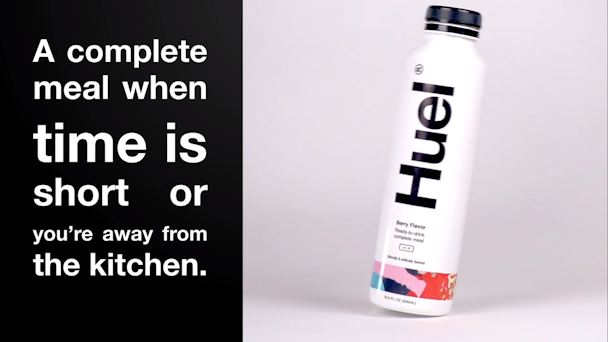After investing in TV for the first time, Huel is going back to the drawing board
Huel is leaning on performance marketing and word-of-mouth following its experimental forays into TV and OOH at the end of 2018.

How food replacement brand Huel is betting big on performance marketing
Huel is a meal replacement product, available in powder, bar and drink formats. It has now sold more than 45 million packets but has bigger goals of taking over the convenience market. In 2018, £40m in revenue and 185% year-on-year growth attracted a £20m investment from investor Highland Europe.
That same year it debuted its first-ever TV campaign. London creative agency And Rising developed an ad introducing the product and its category “fast-paced and the health conscious” UK citizens.
The campaign burst across Comedy Central, Dave, Sky News, E!, Fox, Lifetime and more.
Despite the significant investment, founder Julian Hearn wasn't convinced: "I was persuaded internally to do some of these [traditional media campaigns]. I'm not a fan of offline really at all.
“TV probably influences me as an individual so we gave it a go but it was very difficult to measure and track."
Hearn, who has accumulated ecommerce and retail experience across marketing stints at promotionalcodes.org, Dialaphone, Tesco, Starbucks and Waitrose, did not believe that there was a “clear indication” that the TV work was “significantly better” or more effective than other marketing activities run by the brand.
Outdoor ads “didn't work anywhere near as well as what we get from online,” he claimed. And press has largely resulted in stories like ‘One Giant Leap for My Bowels’, ‘[Huel] Made me feel less spaceman, more idiot’ and ‘My week on Huel’.
Hearn said: “Some journalists have just jumped into the deep end and claimed Huel is to replace all of your food. That's not what it's about. It's about replacing most inconvenient meals. We've all got those, whether it's once a month or whether it's five or 10 meals a week.”
Despite selling 2.7m meals in January 2019 (£5.3m revenue) on its ecommerce platform, Hearn said its next wave of marketing will not see 'traditional' media return to plans.
“I don't like guessing or hoping. I'd rather get what I paid for,” he added.
Instead, the company's marketers are back to experimenting with digital marketing channels to find the best way to get the word out.
“We’ve got very low penetration in our lead markets [in order of sales, UK, US, Europe]. Our main competitor is the sandwich, toast and cereal. Those products have very high penetration so we've got a lot of headroom to expand into.”
US-based meal replacement Soylent does not factor in as a "rival", rather an ally in Hearn's eyes.
"All of its advertising is contributing to educating customers so that when they get into this category, customers can make their own informed choice and we think we have got the superior formula, ingredients and packaging... we are the Mercedes of this category."
Performance Marketing
The vegan and gluten-free company's customer breakdown is roughly 65% male, 35% female. They are predominantly time-poor office workers between age 25-45 although Hearn's also been on the phone with the elderly who often prefer Huel to the rigmarole of cooking.
Hearn is primarily concerned with two metrics, the onsite conversion rate (traffic to its primary sales channel), and the retention rate of the product itself (how long customers stay subscribed).
But there will also be a push into retail, chiefly convenience stores and petrol stations, the “impulse places”. For the weekly shop, he noted that consumers are best going through the website and taking advantage of the free delivery.
“We can do that better for you from for direct, it’s already a better experience.” It may be after these rollouts, that the out of home or TV advertising could see a rise in effectiveness, once the brand becomes more readily available.
From a retention standpoint, Huel sees its advertising as a means of “getting the ball rolling”.
Hearn added: “We really we want to focus heavily on making customers happy. If we make them happy, they will come back. And they will tell a friend, that's how the word spreads.”
He concluded: “It is not a niche product, it is something that when the mass market start to use it, they realized there is something there. It is a little bit of a novel product, a little bit alien, but once people are introduced to it either through friends or family, the uptakes will get going.”

